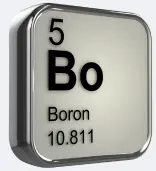
Boron, a trace mineral found naturally in food and the environment, has gained attention in the medical world. Though its primary role has been associated with plants, emerging research highlights its potential health benefits for humans. This article explores its advantages, necessary precautions, and what scientific studies reveal about its medicinal use.

Here are some health benefits of using boron:
Bone Health: Boron plays a role in bone metabolism and helps in the absorption and utilization of minerals like calcium, magnesium, and vitamin D, which are essential for bone strength and density.
Brain Function: Boron can enhance cognitive performance, improving coordination, attention, and memory. It’s associated with better mental alertness.
Anti-Inflammatory Effects: Boron has anti-inflammatory properties, potentially reducing the symptoms of inflammatory conditions like arthritis.
Hormone Regulation: Boron helps balance hormones, supporting testosterone production in men and estrogen metabolism in women, which can benefit overall hormone health.
Wound Healing: It aids in wound healing by supporting the production of enzymes that repair damaged tissue and reduce inflammation at the injury site.
Immune System Support: Boron can enhance the immune response by supporting the production of antibodies and improving the body’s defense against pathogens.
Reduction of Oxidative Stress: As an antioxidant, boron helps reduce oxidative stress and combat free radical damage, which can protect cells and reduce the risk of chronic diseases.
Metabolism and Energy Production: Boron is involved in energy production by supporting enzyme activity, which aids in breaking down nutrients and producing energy at the cellular level.
Improved Mineral Absorption: It enhances the absorption of essential minerals like magnesium and phosphorus, which are vital for various bodily functions, including heart and muscle health.
Potential Cancer Prevention: Some studies suggest boron might reduce the risk of certain cancers, particularly prostate and cervical cancers, though more research is needed in this area.
Always consult a healthcare professional before supplementing with boron, as excess intake can be harmful.
Boron can be consumed through both dietary sources and supplements. Foods such as almonds, avocados, raisins, and broccoli are naturally rich in boron. For those considering supplements, typical doses range from 3 to 10 mg per day, but it’s essential to start with a lower dose and gradually increase if needed. Taking boron with food can improve absorption and reduce the risk of stomach discomfort. It’s crucial to follow recommended dosages and consult a healthcare provider, especially if you are pregnant, nursing, or taking other medications, to ensure safe and effective use.

Boron is naturally present in a variety of foods and also available as a dietary supplement. Fruits like apples, pears, and grapes, along with vegetables such as broccoli, spinach, and potatoes, are good sources of boron. Nuts and seeds, including almonds and walnuts, also contain significant amounts. Additionally, legumes like beans, chickpeas, and lentils provide boron. Drinking water in certain regions may contain small amounts of boron, depending on the soil composition. For those seeking more concentrated intake, boron supplements are available in health stores and online, typically in tablet or capsule form.
Despite its potential, boron should be used cautiously. Overconsumption may lead to side effects like nausea, diarrhea, and headaches. While supplements are available, excessive boron intake from these products can disrupt mineral balances in the body.
Pregnant and breastfeeding women should avoid high doses due to limited safety data. People with kidney problems are advised to consult a doctor before taking boron supplements, as improper kidney function can hinder boron elimination from the body.
Moreover, boron supplements might interact with medications, including hormone therapies and anticoagulants. Consulting a healthcare provider before starting boron supplementation is essential.

Scientific research on boron is still in its early stages, but initial findings are promising. Clinical studies have shown that boron plays a role in managing inflammatory markers, which supports its potential for arthritis treatment.
In the area of bone health, research has found that boron can enhance calcium metabolism, reducing the risk of osteoporosis. However, more large-scale studies are needed to determine the most effective dosages for long-term use.
While boron’s effects on brain health are intriguing, the evidence remains inconclusive. Some studies suggest improvements in focus and memory, but further research is required to confirm these findings and establish dosage guidelines.
The decision to use boron depends on individual health needs and potential risks. Boron can support bone health, hormone regulation, and reduce inflammation, making it beneficial for individuals with osteoporosis, arthritis, or hormonal imbalances. It may also enhance cognitive function and aid in wound healing. However, not everyone should use boron supplements. People with kidney issues, pregnant or breastfeeding women, and individuals taking certain medications should avoid or limit boron intake due to potential interactions or side effects. Consulting with a healthcare provider helps determine if boron is appropriate for your specific situation.
Boron holds potential as a supplement for bone health, hormonal balance, and inflammation reduction. However, its use requires careful consideration due to possible side effects and interactions with medications. While the scientific community acknowledges its benefits, more research is necessary to establish clear recommendations. Consulting with a healthcare provider ensures safe and effective use of boron in any wellness routine.

The recommended intake of boron is not officially established, but most studies suggest that 3 to 10 mg per day is safe for adults. For general health, around 3 mg daily from food sources is typically sufficient. However, higher doses, up to 20 mg per day, have been used in research for specific conditions like arthritis, but only under medical supervision. It’s important not to exceed this amount, as excessive intake may lead to side effects like nausea or hormonal imbalances. Always consult a healthcare provider to determine the appropriate dosage for your needs.
Boron is found naturally in soil, rocks, and water. It is also present in various foods, including fruits like apples, pears, and grapes, as well as vegetables such as broccoli, carrots, and potatoes. Nuts, seeds, legumes, and whole grains are additional sources of boron. Drinking water in some regions contains trace amounts of boron, depending on the local soil composition. For those needing more concentrated sources, boron is available in dietary supplements in the form of capsules or tablets.
Boron has been linked to increased testosterone levels in some studies, making it a potential supplement for individuals looking to boost hormonal health. Research suggests that boron can enhance the body’s production of free testosterone by reducing levels of sex hormone-binding globulin (SHBG), which binds to testosterone and makes it inactive. In addition, boron may help decrease inflammation and oxidative stress, factors that can negatively impact hormone production. While these findings are promising, more research is needed to confirm the long-term effects and optimal dosage for testosterone support. Consulting with a healthcare provider is recommended before starting boron supplementation for this purpose.
Copyright All rights reserveds